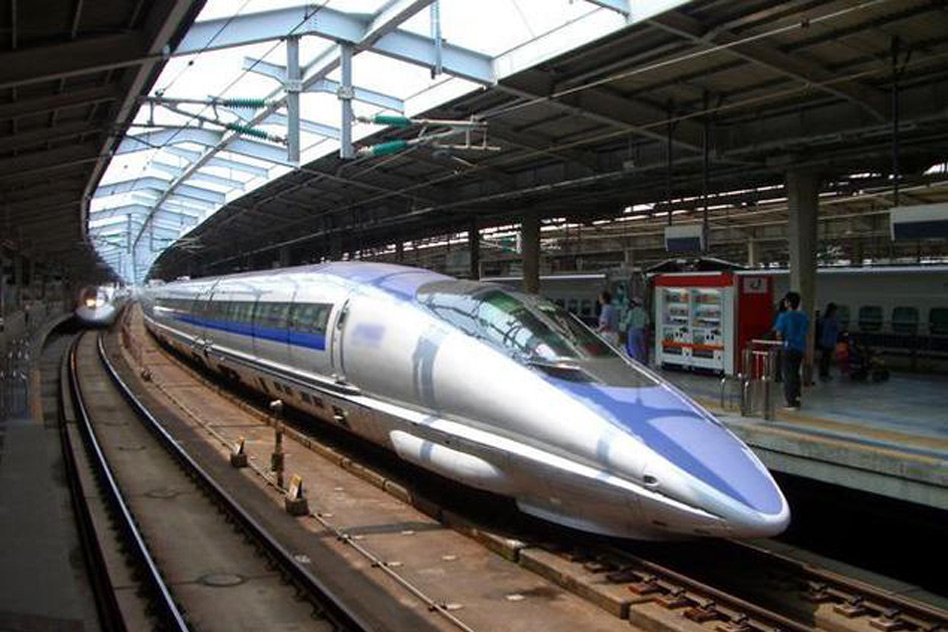Source: economictimes | Image Courtesy: thehindubusinessline
Should India spend billions on bullet trains or use these funds to modernize the existing railways? railway officials and cabinet are in a fix.
Japan has offered to finance India’s first bullet train, estimated to cost $15 billion, at an interest rate of less than 1 percent, officials said, to move ahead a march on China, which is bidding for other projects on the world’s fourth-largest network.
Tokyo was given the responsibility to assess the feasibility of building the 505-kilometre corridor linking Mumbai with Ahmedabad, the commercial capital of Prime Minister Narendra Modi’s home state, and concluded it would be technically and financially viable.
The project to build and supply the route will be put out to tender, but offering finance makes Japan a clear front runner.
In contrast to this, Last month China won the contract to assess the feasibility of a high-speed train between Delhi and Mumbai, a 1,200-km route estimated to cost twice as much. Although, no loan has yet been offered.
Japan’s decision to give virtually free finance for Modi’s pet programme is part of its vision to give broader push back to China’s involvement in infrastructure development in South Asia over the past several years.
“There are several (players) offering the high-speed technology. But technology and funding together, we only have one offer. That is the Japanese,” said A. K. Mital, the chairman of the Indian Railway Board, which manages the network.
The two projects are part of a ‘Diamond Quadrilateral’ that India wants to set up connecting Delhi, Mumbai, Chennai and Kolkata of high speed trains over 10,000 km of track. Japan has offered to meet 80 percent of the Mumbai-Ahmedabad project cost, on condition that India buys 30 percent of equipment including the coaches and locomotives from Japanese firms, officials said.
The journey time between Mumbai and Ahmedabad would be cut to two hours from seven as confirmed by the Japan’s International Cooperation Agency, which led the feasibility survey, said. The route will require 11 new tunnels including one undersea near Mumbai.
“What complicates the process is Japanese linking funding to use of their technology. There must be tech transfer,” said Mital.
RICKETY RAIL
JICA declined to comment on the details of its offer. “The report has already been handed over to India, and the Indian government is now in the process of making a consideration,” a spokeswoman said.
Toshihiro Yamakoshi, counselor in the economic section of the Japanese embassy, said Japanese companies were keen to collaborate with their Indian counterparts on the rail project as part of Modi’s Make-in-India programme. He said it was too early to provide details of the cooperation.
Tokyo’s push in India comes just weeks after it lost out to China on the contract to build Indonesia’s first fast-train link.
Japan’s NHK broadcaster quoted Transport Minister Keiichi Ishii as saying that Prime Minister Shinzo Abe had instructed him to step up exports of transport systems to India and Southeast Asia.
“It is very regrettable that a high-speed railway project in Indonesia was awarded to China,” he said.
China won the Delhi-Mumbai survey after securing clearance from Indian security agencies long stressed about China’s involvement in Indian infrastructure.
Though the two neighbors fought a war in 1962 over a border dispute that remains unresolved, the trade between them is booming.
India’s cabinet will take a decision on the Japanese proposal over the next few weeks, an Indian railway official said. He said there were pestering concerns about whether the billions of dollars required for high-speed rail might be more usefully spent in modernizing the railway system.
“There is a lot of money involved in this. The different departments are weighing the implications. Should we be committing all our resources to a single high-speed line,” the railway official said on condition of anonymity.”
“The railways have not attempted anything as big as this before in terms of costs,” the official said.
As a matter of fact, India’s rickety state-controlled rail system, in which 23 million people commutes a day, has a poor safety record and is in dire need of funds to modernize it.
The average speed of trains is 54km/hour, and rail experts have argued that the priority ought to be to improve the speed and safety on existing trains and routes than investing the billions in bullet trains.
We wish that the responsible take appropriate decisions after careful consideration, keeping the daily commuters in mind.












